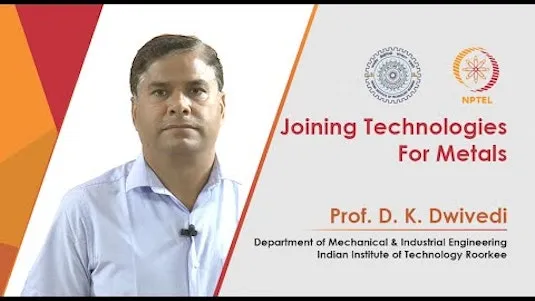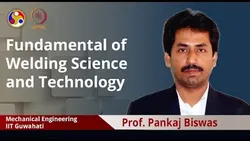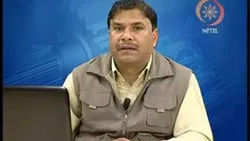
Joining Technologies For Metals 
This course provides an overview of joining technologies for metals, including fundamentals of metal joining technologies, fusion-based processes, solid-liquid joining processes, solid-state joining processes, adhesive joining, metallurgical aspects of welding, and common issues related to joining technologies. It is a core course for UG/PG students and practicing engineers, with no prerequisites. Students will learn about mechanisms for obtaining metallic continuity, oxy-fuel welding, arc welding, laser beam welding, spot welding, brazing and soldering, braze welding, cold metal transfer welding, diffusion bonding, ultrasonic welding, explosive welding, and adhesive joining. ▼
ADVERTISEMENT
Course Feature
![]() Cost:
Cost:
Free
![]() Provider:
Provider:
Swayam
![]() Certificate:
Certificate:
Paid Certification
![]() Language:
Language:
English
![]() Start Date:
Start Date:
23rd Jul, 2023
Course Overview
❗The content presented here is sourced directly from Swayam platform. For comprehensive course details, including enrollment information, simply click on the 'Go to class' link on our website.
Updated in [May 25th, 2023]
Joining Technologies For Metals is a core course for UG/PG students and practicing engineers. It covers the fundamentals of metal joining technologies, fusion based processes, solid-liquid joining processes, solid state joining processes, adhesive joining, metallurgical aspects of welding, and common issues related with joining technologies and their causes and remedies. The course includes mechanisms for obtaining metallic continuity, oxy-fuel has welding, common arc welding processes, laser beam welding, spot welding processes, newer variants of fusion welding processes, brazing and soldering, braze welding, cold metal transfer welding, diffusion bonding, ultrasonic welding and explosive welding, design, procedure, and applications of adhesive joining, weld thermal cycle, solidification of weld metal, weldability of carbon steel, alloys steel, stainless steels, and aluminium alloys, Fe-C, CCT and schaffler diagram for understanding the metallurgical transformation in weld and heat affected zone, basics of residual stresses, hardening and softening of heat affected zone, porosity, and cracking. No pre-requisites are required for this course.
[Applications]
Upon completion of this course, students will have a comprehensive understanding of the fundamentals of metal joining technologies, including fusion-based processes, solid-liquid joining processes, solid-state joining processes, adhesive joining, and metallurgical aspects of welding. They will also be able to identify common issues related to joining technologies, their causes, and remedies. This course is beneficial for undergraduate and postgraduate students, as well as practicing engineers. It is also applicable to a variety of industries, including automotive, aerospace, and manufacturing.
[Career Paths]
1. Welding Engineer: Welding Engineers are responsible for designing, developing, and testing welding processes and equipment. They also oversee the production of welded components and ensure that they meet safety and quality standards. Welding Engineers must have a strong understanding of metallurgy and welding processes, as well as the ability to troubleshoot welding issues. The demand for Welding Engineers is expected to grow as the need for more efficient and cost-effective welding processes increases.
2. Metallurgist: Metallurgists are responsible for studying and analyzing the properties of metals and alloys. They use their knowledge of metallurgy to develop new materials and processes, as well as to improve existing ones. Metallurgists must have a strong understanding of the physical and chemical properties of metals and alloys, as well as the ability to analyze and interpret data. The demand for Metallurgists is expected to grow as the need for new and improved materials and processes increases.
3. Quality Control Technician: Quality Control Technicians are responsible for ensuring that products meet quality standards. They inspect products for defects, analyze data, and make recommendations for improvement. Quality Control Technicians must have a strong understanding of quality control processes and procedures, as well as the ability to troubleshoot issues. The demand for Quality Control Technicians is expected to grow as the need for more efficient and cost-effective quality control processes increases.
4. Manufacturing Engineer: Manufacturing Engineers are responsible for designing, developing, and testing manufacturing processes and equipment. They also oversee the production of components and ensure that they meet safety and quality standards. Manufacturing Engineers must have a strong understanding of manufacturing processes and equipment, as well as the ability to troubleshoot issues. The demand for Manufacturing Engineers is expected to grow as the need for more efficient and cost-effective manufacturing processes increases.
[Education Paths]
Degree Paths:
1. Bachelor of Science in Welding Engineering: This degree program focuses on the fundamentals of welding engineering, including welding processes, metallurgy, and welding safety. Students learn about the principles of welding, the different types of welding processes, and the metallurgical aspects of welding. They also learn about the design and fabrication of welded components, as well as the inspection and testing of welded components. This degree program is ideal for those interested in a career in welding engineering.
2. Master of Science in Welding Engineering: This degree program builds on the fundamentals of welding engineering, and focuses on advanced topics such as welding automation, welding metallurgy, welding process optimization, and welding process control. Students learn about the principles of welding automation, the different types of welding processes, and the metallurgical aspects of welding. They also learn about the design and fabrication of welded components, as well as the inspection and testing of welded components. This degree program is ideal for those interested in a career in welding engineering.
3. Doctor of Philosophy in Welding Engineering: This degree program focuses on the advanced topics of welding engineering, including welding automation, welding metallurgy, welding process optimization, and welding process control. Students learn about the principles of welding automation, the different types of welding processes, and the metallurgical aspects of welding. They also learn about the design and fabrication of welded components, as well as the inspection and testing of welded components. This degree program is ideal for those interested in a career in welding engineering.
4. Certificate in Welding Technology: This certificate program focuses on the fundamentals of welding technology, including welding processes, metallurgy, and welding safety. Students learn about the principles of welding, the different types of welding processes, and the metallurgical aspects of welding. They also learn about the design and fabrication of welded components, as well as the inspection and testing of welded components. This certificate program is ideal for those interested in a career in welding technology.
Developing Trends:
1. Automation: Automation is becoming increasingly important in welding engineering, as it allows for faster and more efficient welding processes. Automation also allows for more precise control of the welding process, which can lead to improved weld quality and reduced costs.
2. Robotics: Robotics is becoming increasingly important in welding engineering, as it allows for faster and more efficient welding processes. Robotics also allows for more precise control of the welding process, which can lead to improved weld quality and reduced costs.
3. 3D Printing: 3D printing is becoming increasingly important in welding engineering, as it allows for faster and more efficient welding processes. 3D printing also allows for more precise control of the welding process, which can lead to improved weld quality and reduced costs.
4. Virtual Reality: Virtual reality is becoming increasingly important in welding engineering, as it allows for faster and more efficient welding processes. Virtual reality also allows for more precise control of the welding process, which can lead to improved weld quality and reduced costs.
Course Provider

Provider Swayam's Stats at AZClass
Discussion and Reviews
0.0 (Based on 0 reviews)
Explore Similar Online Courses

Sounds True Presents: The Yoga of Awakening

Supply chain management: Be global

Python for Informatics: Exploring Information

Social Network Analysis

Introduction to Systematic Review and Meta-Analysis

The Analytics Edge

DCO042 - Python For Informatics

Causal Diagrams: Draw Your Assumptions Before Your Conclusions

Whole genome sequencing of bacterial genomes - tools and applications

Welding Safety

Fundamental of Welding Science and Technology


Start your review of Joining Technologies For Metals